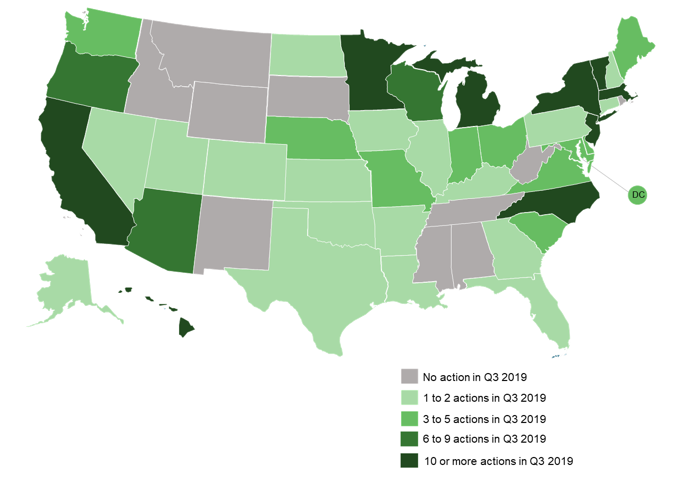The 50 States of Electric Vehicles: States Consider a Variety of Utility-Led Transportation Electrification Initiatives in Q3 2019
Raleigh, NC – (November 6, 2019) The N.C. Clean Energy Technology Center (NCCETC) released its Q3 2019 update edition of The 50 States of Electric Vehicles. The quarterly series provides insights on state regulatory and legislative discussions and actions on electric vehicles and charging infrastructure.
The report finds that 40 states and the District of Columbia took actions related to electric vehicles and charging infrastructure during Q3 2019 (see figure below), with the greatest number of actions relating to rebate programs, charging station deployment, and rate design for electric vehicle charging.
A total of 298 electric vehicle actions were taken during Q3 2019. This represents a significant decrease over Q2 2019, due to the majority of state legislatures adjourning in the first half of the year. However, Q3 2019 activity represents a 41% increase over Q3 2018.
The report discusses three trends in electric vehicle actions taken in Q3 2019: (1) states and utilities focusing on rebate programs for electric vehicles and charging infrastructure, (2) utilities proposing programs to address multiple charging types and locations, and (3) utilities proposing innovative electric vehicle charging pilot projects.
Q3 2019 State and Utility Action on Electric Vehicles

“We’re seeing utilities proposing plans to address electric vehicle charging from a number of different angles,” observed Autumn Proudlove, Senior Manager of Policy Research at NCCETC. “Utilities across the country are developing expansive transportation electrification plans that support different types of charging through specific approaches, such as rebates for workplace charging or utility deployment of fast chargers.”
The report notes five of the top policy developments of the quarter:
- The North Carolina Department of Transportation releasing its final zero-emission vehicle plan;
- Arizona regulators approving an electric vehicle implementation plan;
- The Maine Public Utilities Commission issuing a beneficial electrification request for proposals;
- Portland General Electric filing its transportation electrification plan with Oregon regulators; and
- The Iowa Utilities Board exempting charging stations served by behind-the-meter generation from utility regulation.
“A lot of the activity occurring during Q3 2019 sets the stage for further action in the coming months and years,” said Brian Lips, Senior Policy Project Manager at NCCETC. “A number of studies were launched during the quarter and additional utilities filed transportation electrification plans, highlighting new programs they intend to offer in the near future.
View the 50 States of Electric Vehicles Q3 2019 Executive Summary
View and Purchase the 50 States of Electric Vehicles Q3 2019 update FULL Report
View other 50 States Reports – Solar, Grid Modernization and Electric Vehicles
ABOUT THE N.C. CLEAN ENERGY TECHNOLOGY CENTER
The N.C. Clean Energy Technology Center, as part of the College of Engineering at North Carolina State University, advances a sustainable energy economy by educating, demonstrating and providing support for clean energy technologies, practices and policies. It serves as a resource for innovative, sustainable energy technologies through technology demonstration, technical assistance, outreach and training. For more information about the Center, visit: http://www.nccleantech.ncsu.edu. Twitter: @NCCleanTech
MEDIA CONTACT: Shannon Helm, NCCETC, shannon_helm@ncsu.edu